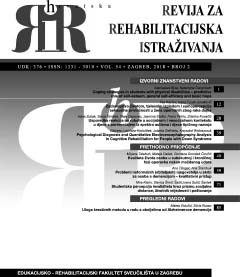Kvaliteta života osoba u subakutnoj i kroničnoj fazi oporavka nakon moždanog udara
Quality of life of patients in the sub-acute and chronic phases of recovery after a stroke
Author(s): Mirjana Telebuh, Mateja Dašek, Gordana Grozdek ČovčićSubject(s): Psychology, Health and medicine and law
Published by: Sveučilište u Zagrebu, Edukacijsko-rehabilitacijski fakultet
Keywords: stroke; sub-acute and chronic phase of recovery; quality of life;
Summary/Abstract: Stroke is the leading cause of permanent physical disability both in the world and in Croatia. Although the most affected population is the elderly, stroke also affects a large number of working people, making stroke not only a health problem, but also a major social and economic problem. The most common consequences of a stroke are a loss of motor skills, walking ability, and fine motor skills, although fatigue, vision problems, and personality changes can also be present, influencing the patient’s quality of life. Recovery up to 3 months after a stroke is considered the acute/sub-acute phase of recovery, while recovery after 6 months is considered the chronic phase of recovery. The aim of this study was to examine the quality of life of stroke survivors in the sub-acute and chronic phases of recovery. The Stroke-Specific Quality of Life Scale (SS-QOL) questionnaire was used to examine the quality of life in patients after stroke. The study included 60 subjects divided into two experimental groups: 30 subjects in the sub-acute phase of recovery and 30 subjects in the chronic phase of recovery after a stroke. Among all subjects, the most negative aspects of quality of life were found in the area of self-care, functional productivity, social life and personality. Subjects in the chronic phase of recovery after stroke showed significantly better quality of life than subjects in the sub-acute phase of recovery. Quality of life correlated significantly with the age of subjects, but not with their gender or number of strokes. These results suggest that the quality of life of stroke survivors diminishes mostly due to decreased self-care, functional dependence, social isolation, and personality problems. Early rehabilitation under the supervision of a multidisciplinary team, together with an individual, holistic and functional approach could provide better care and quality of life for patients after a stroke.
Journal: Hrvatska revija za rehabilitacijska istrazivanja
- Issue Year: 54/2018
- Issue No: 2
- Page Range: 49-58
- Page Count: 10
- Language: Croatian

